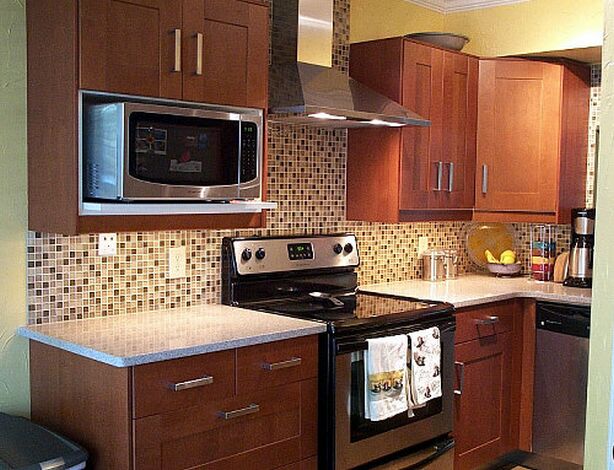
Granite is one of the toughest countertop materials in the market, but it’s not impervious to damage. So if you are asking, do granite countertops stain? Yes, they do stain. While the countertop is tough, it’s porous, and liquids can penetrate the surfaces and cause stains.
Types of stains
The countertops can be affected by different types of stains that include:
Water stains: Water stains are temporary and when they happen, they darken or lighten the countertop material. The good thing is when water evaporates, the color of the stone returns to normal.
Organic stains: These are brought about by organic materials such as mustard, soda, tea, and others.
Inorganic stains: They result from dyes, dirt, ink, and others.
Oil stains: Butter, cooking oil, and mineral oils will damage the countertops when they land on them.
Biological stains: Popular biological stains include: mold and mildew.
Metal stains: Metal stains include rust, copper and many others.
What should you do when your countertops stain?
To retain the elegant look of the countertops, you should remove the stains as soon as they happen. How you remove the stains depends on the nature of the stain. To remove the stains, follow these steps:
Begin with creating a thick paste of hydrogen peroxide and talc powder. For ideal results, ensure the paste has a consistency of putty.
You should then apply the mix to the stained area while taking care not to apply it on the unstained areas. Experts recommend you keep the layer of paste one-fourth of an inch thick and should overlap the stain by about half an inch.
After applying the paste, cover the area with a plastic wrap and tape the edges. Let the paste sit for 24 hours after which you should remove it only leaving the poultice in place. Let the poultice stay on the stain until it completely dries up.
You should then use a plastic scraper and scrape away all the paste. If any paste remains, wipe it with a clean cloth. Follow up with cleaning the countertops normally and dry it with a clean cloth.
In most cases, this will remove the stain, but if it doesn’t, repeat the process and the stain will go away.
Can you prevent stains from coming about?
Yes, you can do it by taking good care of the countertops. When you are in the kitchen, take care not to spill products on the countertops. Even when spills happen, hurry and clean them up.
To prevent water spills, seal the countertops. For ideal results, follow the right sealing procedure:
Begin with cleaning the counters with water and allow them to dry out completely.
You should then shake the sealer and apply it liberally to every part of the countertop using paper towels, paint roller, or paintbrush. When applying the sealer, ensure you have a thin film on the entire surface of the stone.
After applying the sealer, let it soak into the counters for at least 15 minutes after which you should wipe it off with a clean cloth.
If your countertops are white or have another color susceptible to staining, apply a second sealer coat. Upon applying the first coat, wait for at least 48 hours then apply the second coat.
Once done, wipe the counters with clean towels and paper towels, making sure you wipe away excess sealer. Before you start using the countertops, leave them for at least 24 hours.
Other ways to protect granite
Other than sealing the countertops, there are plenty of different ways you can protect them from stains and other forms of damage. Some of these ways include:
Protect them from UV rays: Most granites are combined with resins susceptible to UV-ray damage that leads to fading and dulling of color. In addition to keeping curtains closed when it’s sunny, talk to your granite contractors Durham and understand the best product to provide maximum protection.
Use pH-neutral cleaners: Granite is sensitive to acidic and alkaline-based cleaners so only use pH-neutral cleaners. Using the wrong products not only stains the surfaces, but it also etches them, so you have to replace them, which is expensive.